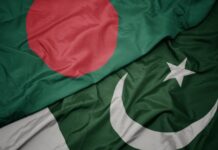The Tehreek-e-Labbaik Pakistan (TLP), a radical Islamist extremist group has gained further political capital in the country as the federal government over the last weekend agreed to issue a letter declaring that the TLP was not a terrorist organisation.
It would be further acknowledged in the letter that it was a political party registered with the Election Commission of Pakistan (ECP) and, therefore, there is no ban on its coverage in the media and it will have complete freedom for political activities just like other political parties.
The ruling alliance also agreed with the TLP’s leadership to quash all “political cases” registered against the party leaders and workers after the party announced ending its Pakistan Bachao March (Save Pakistan March).
Interior Minister Rana Sanaullah and Economic Affairs Minister Sardar Ayaz Sadiq signed the agreement with the TLP’s key leaders, Dr Muhammad Shafique Amini and Allama Ghulam Abbas Faizi. The announcement about signing of the agreement and ending the march was made in a joint news conference on Saturday afternoon.
Through the agreement, the federal ministers have agreed that all the notifications issued against the TLP by Pakistan Electronic Media Regulatory Authority (PEMRA) and the Pakistan Telecommunication Authority (PTA) in the past would be de-notified.
Moreover, the government would lift a ban from all those TLP leaders and workers who have already been excluded from the 4th scheduled list, saying the federal government will also issue directions to the provincial governments in this regard.
Under the newly-signed agreement, it has been decided that the government would write a letter to the US government in three working days for the release of Dr Aafia Siddiqui, who has been serving a sentence in US on charges of attempting to kill American nationals outside the country. The government gave its consent that it would take serious steps to bring Dr Siddiqui back to Pakistan.
Among other things, the agreement states that Section 7 (punishment for acts of terrorism) of the Anti-Terrorism Act, 1997, would be applicable on the suspects facing charges of committing blasphemy under section 295-C (use of derogatory remarks, etc., in respect of the Holy Prophet:) of the Pakistan Penal Code.
In addition, both sides have agreed to establish a “Counter Blasphemy Wing” under the Federal Investigation Agency (FIA). The wing is being established with the aim to increase and enhance the capacity of the institution already working and to stop desecration of the religious materials.
The government has agreed with TLP that a filtration system would be enforced through which blasphemous material and immoral content would be removed from social media. Both sides also agreed to ensure unbiased but speedy trial of the accused facing charges of blasphemy, saying the appeals would also be swiftly decided.
Source: Pakistan local media
